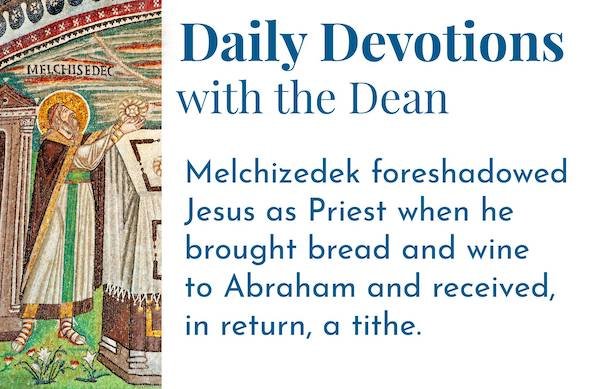Tuesday • 2/13/2024 •
Tuesday of Last Epiphany or Shrove Tuesday, Year Two
This morning’s Scriptures are: Psalm 26; Psalm 28; Proverbs 30:1–4,24–33; Philippians 3:1–11; John 18:28–38
This morning’s Canticles are: following the OT reading, Canticle 13 (“A Song of Praise,” BCP, p. 90); following the Epistle reading, Canticle 18 (“A Song to the Lamb,” Revelation 4:11; 5:9–10, 13, BCP, p. 93)
Welcome to Daily Office Devotions, where every Monday through Friday we draw insights from that day’s Scripture readings, as given in the Book of Common Prayer. I’m Reggie Kidd, and I’m grateful to be with you this Tuesday in the Last Week After Epiphany. Our readings come from Year 2 in the Daily Office Lectionary.
Tomorrow is Ash Wednesday, which makes today Shrove Tuesday. The term “shrove” comes from an old English word “shrive,” which means “absolve.” Thus, it’s a day of confession and absolution. On Shrove Tuesday, some churches burn the previous year’s Palm Sunday ashes for use in the following day’s Ash Wednesday liturgy. The eating of richer and fattier foods (in the Anglican church world, pancakes are the norm) anticipates a leaner and more austere diet during Lent (which accounts for the celebration of Mardi Gras, literally, “Fat Tuesday,” in some traditions).
On Shrove Tuesday, Christ’s followers are invited to take stock of wrongs that need to be corrected in their lives, and to ask God for help in personal reformation. The day has its place in the classic Christian discipline of what Paul calls “dying to sin” and “living to righteousness,” or what older theologians called “mortification and vivification.”
Today’s Old Testament and Epistle readings provide an opportunity for taking stock and looking to God for help.
Proverbs 30. Without God’s wisdom, confesses Proverbs 30 author, Agur, son of Jakeh (otherwise unknown to us), we are lost in the universe. We need a word from outside our plane of existence: “Who has ascended to heaven and come down? … Who has established all the ends of the earth? What is the person’s name? And what is the name of the person’s child? Surely you know!” (Proverbs 30:4). Here’s one of the Old Testament’s clearest calls for God to send his Wisdom in person!
Meanwhile, Agur invites us to observe the created order and learn what life-lessons it holds for us. The first thing that this discipline will require for many of us is that we slow down, sit patiently, and observe.
Ants, badgers, locusts, and lizards teach profound things about cooperation, creativity, mutual deference (Proverbs 30:24–28), In ironic juxtaposition, the lion’s stateliness and the rooster’s strutting give perspective to prideful aspiration (Proverbs 29–31). For, in the end, self-exaltation, evil schemes, and pressing anger are poor life strategies — the antidote for which is to become “shriven.”
Philippians 3. Paul’s words here are especially apt for Shrove Tuesday meditation. All of us who think we make it through life on our bona fides, or by building our resumes and portfolios, would do well to heed the apostle who discovered for himself that it’s all “rubbish” (a polite rendering in English of solid waste material that goes into a toilet — Philippians 3:8).
Seriously, take time to read through Paul’s credentials and his rejection of their worth. The point isn’t to make us rip diplomas off our walls, but to make us understand that those things don’t commend us to God. They certainly don’t make a life.
Then, read carefully and slowly why Paul can divest himself of his personal and social capital: “I want to know Christ and the power of his resurrection and the sharing of his sufferings by becoming like him in his death, if somehow I may attain the resurrection from the dead” (Philippians 3:8–11). Knowing Christ is life. And he can indeed be known because, while his body was pierced for our transgressions, and while his dead body was laid in a tomb just outside Jerusalem, nonetheless, he is now the resurrected, ascended, and returning Lord.
“…and the power of his resurrection…” — Because he is raised from the dead and promises a full resurrection like his when he returns in glory, there’s also a power for living in the now that Christ can and does extend to us.
“…and the sharing of his sufferings…” Paul’s phrase is “the koinonia, the fellowship, of his sufferings.” This “koinonia of sufferings” is more than the fact that we experience sufferings that are like or similar to his. There is a mysterious way in which, because Christ does in fact live now, he can and does come to us when we suffer in this life. By his Spirit within us, Christ is ever-present to us; he personally and really communes with us and shares our sufferings with us. That’s what Paul is saying. Christ indeed tells us to take up our cross, but he does not ask us to bear it alone.
Part of what we do on Shrove Tuesday is renounce the “rubbish.” The other part of what we do is ask for more of knowing Christ and the power of his resurrection and the fellowship of his sufferings. May Christ “shrive” us, and indeed meet us in the renunciation of the “rubbish” and in the asking to know him better.
Be blessed this day,
Reggie Kidd+













